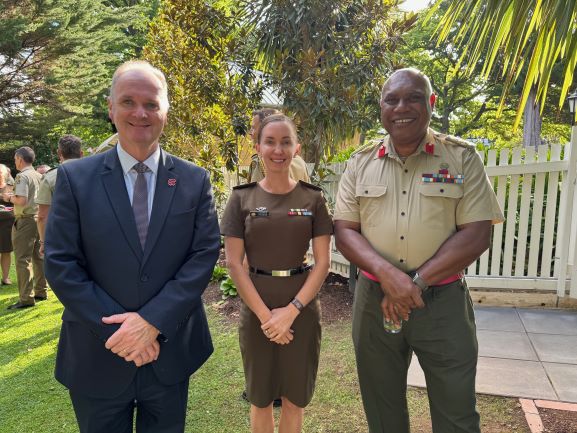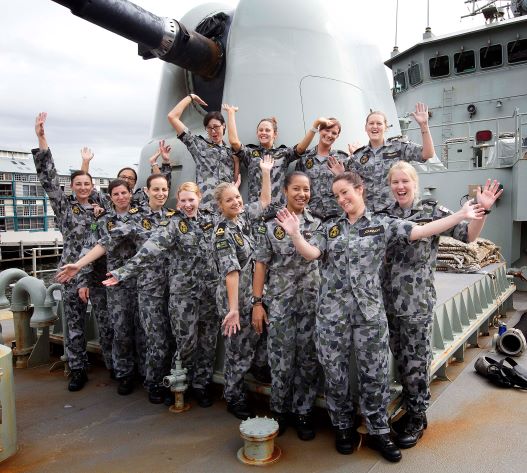Meeting the unique needs of female veterans
By Major Lyndsay Freeman, Chair of Women Veterans Australia

Australian women have deployed on military operations since the Boer War. With a sharp increase in ADF women deployed to Iraq, Afghanistan and peace operations missions across the globe, the needs of veteran women are now in the spotlight.
According to the 2021 Census, women make up 20.6 per cent of current serving ADF members, and around 13.5 per cent of Australia’s veteran community.
When speaking with servicewomen, it is clear they are a humble and community- focused group who are proud of their service to their country. They have served in many different roles, including active ones such as explosive ordinance experts, pilots, surgeons, allied-health professionals, communications experts and engineers.
Female veterans experience military training, operational deployments and transition into civilian life in different ways to their male counterparts. Their unique needs and challenges have largely been invisible, with the majority of Australia’s wonderful ex-service organisations tailored to the experience of male veterans.
This inherent gender bias manifests itself in the provision and types of services and treatments for female veterans. As well as detracting from their positive reflection of their service, it also leads to poorer health outcomes, reduced engagement in protective health behaviours, and reduced perceptions of healthcare quality.
Women-centric health care, both in the military and provided by DVA, has mainly been gynaecological. I would like to see female veterans receiving support that fully takes into account that women experience PTSD and other mental health conditions differently.
According to Royal Australian Medical Corps officer Liz Daly, the experience of PTSD seems to be more acute for female personnel. One study (published in Psychological Bulletin, 132(6)) comparing 96 cases of PTSD found that female veterans experienced more severe symptoms than male veterans. Further research (Military Medicine, March 2015) has found that, compared with male veterans, women are more inclined to internalise emotions relating to a traumatic event.
Female veterans often transition from the ADF with complex psychosocial histories, as well as higher rates of sexual trauma resulting from sexual harassment and abuse in the military than male veterans. There is also evidence that some veteran women delay or avoid accessing DVA services due to their negative gendered experiences when seeking healthcare in the past.
Servicewomen are more likely to be primary carers of children and other dependants. This makes their experience of deploying on operations and exercises, as well as attending the required courses for promotion, different to non-primary carers. For instance, while I was on a 9-month deployment in the Middle East, I still had to do my kids’ admin.
The nuances and challenges in service and transition are numerous and complex, but there is no denying that a tailored, gender-specific lens is required for women who serve their nation. They risk being treated like the minority, face limitations in what roles and positions they can perform, and often feel like “the other” in the male-dominated organisation. So when they transition, there’s a need for safe spaces where female veterans can talk candidly about issues such as the sexual abuse and harassment they experienced in the military.
Things are improving, but female veterans continue to face a unique set of challenges. Women Veterans Australia is proud to be part of the solution.

Who are Women Veterans Australia?
Women Veterans Australia (WVA) is a not-for-profit charity founded in April 2021 to support female veterans with their unique needs, concerns and aspirations. It is led by a dedicated and experienced board of directors, along with an expert panel consisting of highly qualified health professionals including psychologists, counsellors, coaches and mentors.
WVA is fortunate to have two outstanding Ambassadors – Peta Irving and Sarah Watson – who bring a wealth of ideas and extensive networks to the charity. As Chair, I’m a current serving Army officer, mother of two, a mentor, and an activist for gender equality.
Many of our volunteers have recovered from trauma and this lived experience adds an invaluable dimension to the organisation’s approach.
Collaboration is key in the veteran community. WVA is committed to supporting the female veteran community in complementary ways to other veteran organisations, as well as representing our members at various forums.
The team has launched headfirst into 2024. With the hope of finding more sustainable funding pathways, we have continued our momentum from 2023 with our Strike for Success series about to launch. This program focuses on empowering women veterans to thrive with knowledge relating to physical and mental healthcare, financial stability, and employment outside of the military. Building on this, WVA seeks to identify initiatives that amplify the voices of our veterans and shine a spotlight on this growing (and at times overlooked) sector of Australia’s veteran community.
The WVA team encourages both veterans and non-veterans of all sexes and genders to consider joining the organisation in some capacity, as it will allow us to extend our reach to ensure every female veteran can achieve their full potential.
More information on WVA can be found on our website (womenveteransaustralia.org.au). You can also keep up to date on new initiatives and programs on our Facebook and LinkedIn pages, as well as our Instagram account: @celebrate_women_veterans.
Images:
Lyndsay Freeman with Matt Anderson (left), Director of the Australian War Memorial, and Brigadier General Covunisaqa, Commander Land Forces, the Republic of Fiji Military
Women of HMAS Anzac come together to celebrate International Women’s Day 2013. (Image: Defence)
